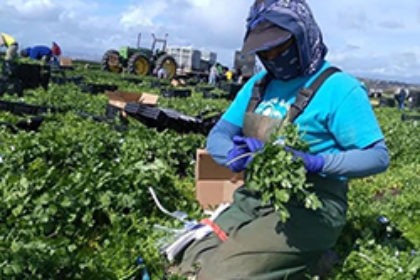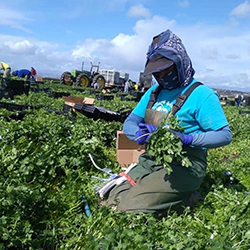
Special opinion piece from Angela Fuentes (She/her/hers), a student of the Public Service and NonProfit Leadership Program at the University of New Hampshire at Manchester. Contact angela.fuentes@unh.edu with questions.
 Foreign agriculture workers harvest your salad tomatoes, grow the potatoes for your French fries, and gather the milk for your cereal. These are not easy jobs. These tasks require strong individuals that must work from 10 to 12 hours a day, must be able to work under low or high weather, pesticide exposure, and with big animals. According to the Bureau of Labor Statistics agriculture and farming are among the top dangerous jobs in the US. The amount of people injured by either machinery or animals has increased over the years. The major form of employing foreign workers is through the H-2A Temporary Agricultural Workers program. In 2019 the US Department of State issued 205,000 H2-A visas. This is the #1 program that farmers use to employ their workers, and although local hiring is recommended, employers are in desperate need of this program. The H-2A program offers foreign workers seasonal employment that provides housing, transportation, food, and at least the minimum wage of the state they’re working. The program itself needs to be improved for the physical and mental health safety of the non-legal hardworking agricultural workers. We can achieve this administratively or individually.
Foreign agriculture workers harvest your salad tomatoes, grow the potatoes for your French fries, and gather the milk for your cereal. These are not easy jobs. These tasks require strong individuals that must work from 10 to 12 hours a day, must be able to work under low or high weather, pesticide exposure, and with big animals. According to the Bureau of Labor Statistics agriculture and farming are among the top dangerous jobs in the US. The amount of people injured by either machinery or animals has increased over the years. The major form of employing foreign workers is through the H-2A Temporary Agricultural Workers program. In 2019 the US Department of State issued 205,000 H2-A visas. This is the #1 program that farmers use to employ their workers, and although local hiring is recommended, employers are in desperate need of this program. The H-2A program offers foreign workers seasonal employment that provides housing, transportation, food, and at least the minimum wage of the state they’re working. The program itself needs to be improved for the physical and mental health safety of the non-legal hardworking agricultural workers. We can achieve this administratively or individually.
This program is not perfect. From 2019 to 2020 the Center for Migrant Rights surveyed more than 100 agricultural workers that worked under the H-2A program. The major problems they found were discrimination, unsafe housing and working conditions, wage violations, and lack of freedom. Among the H-2A applicants, 90 percent are from Mexico. Besides physical consequences, mental health problems are prevalent among agricultural workers either due to economic hardship, lack of freedom, language barriers, or discrimination. When they apply for the visa they have to pay fees and the flight from Mexico to the US. The only way to get the money for the visa is through loans, and although they are promised reimbursements, workers from the survey testified that they are experiencing economic coercion. They don’t allow their spouses and children to come along with the workers, they don’t receive any type of health insurance and they are unable to travel to other places besides their workplace. These workers should be qualified to receive health insurance but sadly the workers have to deal with the injuries when they go back home. However, if we compare these working abroad programs to a study abroad program, the main part of studying abroad is to get to explore the country and not the country exploiting their abilities to study.
Is it a win-win program? Employers get seasonal farmworkers, and farmworkers earn dollars for their families back home, it seems so. However, employers claim that it is actually more expensive for them to hire H-2A workers rather than local ones. And H-2A workers testify that although they get paid in dollars, get housing and transportation, it is not enough to survive the environmental working and living conditions. In the American deserving system, they are the ones who deserve the most.
However, there is hope, in March 2021 the Farm Workforce Modernization Act has been passed by the House of Representatives and is headed to the Senate. This act enables non-legal agricultural workers a pathway to legal status and intends to improve the worker’s concerns previously mentioned. It will allow them to invite their spouse and children to come along with them. The housing conditions will be improved. They will receive a heat illness plan to reduce the number of deaths and injuries provoked by heat stress. The bill will also revise the wages they’re receiving to potentially increase their pay rate. The bill will also enforce safety for their working and living environments.
This is great news and the process for improvement is starting. Non-profits that fight for non-legal workers’ rights have been fighting and waiting for this bill to be passed. The Migrant Justice Organization developed the multidimensional Milk with Dignity program to ensure that the dairy worker’s rights are being protected by causing Ben and Jerry’s Homemade Inc, to adopt the program’s code of conduct. Campaigns like the Milk with Dignity Program are an example of how these non-profits have been advocating for these workers. However, these organizations need support. If you are an immigrant, son, or daughter of immigrants, you know that adjusting to a new country can be tough but we can help by supporting these organizations through donations or signing petitions.
However, being educated is crucial when a system is oppressing a population. You can get more information about these issues on the Food Solutions New England website. Consumers, as well as employers, can protect the rights of the workers by being informed and aware of the issues that the people who make the food we eat and risk their lives for our consumption.




